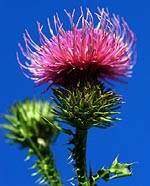| Home A B C D E F G H I J K L M N O P Q R S T U V W X Y Z |
|
Home |
The Health Properties of Burdock

Burdock is a large-leaved, weedy biennial in the daisy family with spiny burr-like fruiting heads. The roots and seeds are used in herbal medicine. The root is available fresh in markets, cut and sifted in herb shops, and in many tincture, capsule, or tablet products. The seed is sold in herb shops that carry Chinese herbs and is found in tinctures, capsules, or tablets. Burdock is a blood purifier that you can use for skin problems such as acne, eczema, and psoriasis, especially the seeds. Herbalists universally recommend the root (called gobo in Japan) to help ease liver congestion and difficulty in digesting fats. Use the root or the seeds for rheumatism and arthritis and the root as a protectant against cancer. Burdock is used to promote kidney function and works through the kidneys to help clear the blood of harmful acids. It is also used for skin disorders such as carbuncles and boils, and relieves gout and menopausal problems. It aids elimination of excess fluid, uric acid, and toxins; and it has antibacterial and antifungal properties. The diaphoretic property of burdock is due to a volatile oil which, taken internally, is eliminated from the sweat glands, thus removing toxic waste. Sweating has a cooling effect on the body. So it is used to reduce fevers and heat conditions such as boils, sties, carbuncles, canker sores, and infections. Burdock contains 27%-45% inulin, the source of most of its curative ability. Inulin is a form of starch. Burdock also has an abundance of iron, which makes it of special value for the blood. Warning: Burdock may interfere with iron absorption. |
|
|
|
|
|
Glossary References Links Contact
|